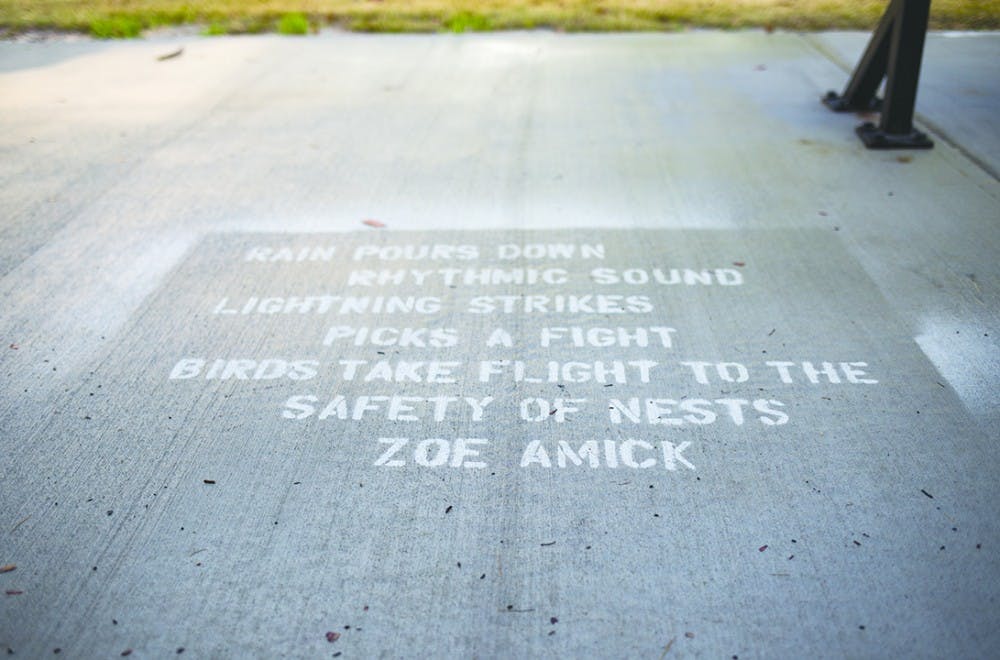Most college students expect to find poetry in their textbooks, not on their campus sidewalks.
For weeks, though, small poems written in white paint have unexpectedly appeared on the sidewalks of heavily trafficked areas at USC. There are three near the health center, one by Longstreet Theatre and two others across from Pendleton Garage. While the poems aren't the work of a magician, it might feel like it since the poems only show up after rainfall.
One Columbia’s "Rain Poetry" project has both literally and figuratively taken the city by storm. The project is helmed by Ed Madden, the first poet laureate of Columbia and an English professor at USC.
"I just hope people are delighted and tickled and surprised when they come across these in the rain. That's part of the fun of a project like this," Madden said.
As the poet laureate, Madden is responsible for showcasing poetry in everyday life and using poetry as a vehicle to give a voice to young and local writers. The poet laureate is an unpaid public position, and Madden has held it since 2015. Some of his past projects include disguising poetry as fake parking tickets, printing poetry on coffee sleeves for local coffee shops and hiding poetry on COMET buses.
Madden's "Rain Poetry" project was inspired by a similar project in Boston. However, whereas the Boston project painted poems from canonical poets such as Langston Hughes or T. S. Eliot, Madden decided that he wanted to showcase work from local poets.
The result is a series of 11 poems that are hidden in more than 20 locations across the city. Besides USC's campus, other poems can be found in both the Vista and Five Points entertainment districts. Like the chosen locations for the poems, the range of poets are just as diverse, with some being middle school students.
“I just think a range of voices makes for a better project," Madden said. "I just think it's important if part of the goal of being poet laureate is to give voice to the city. I think the city has lots of different voices, all of which should be heard."
While Madden initially requested poems about weather and rain, he also asked for poems about "things passing [or] things vanishing," themes he believes capture the essence of the project.
“The one over behind Longstreet Theatre is about thinking about sending a love letter to an old lover, but then the urge passes, and I kind of like that one," Madden said. "It fits the project in the sense that so many of these poems appear for only a moment and then they're gone."
Fred Dings, another poet and English professor at USC, is one of the featured poets. In an email, Dings described his poem as "a very short lyrical poem ... [which] must try to do everything in a brief, vivid image intensified by close attention to sound and rhythm."
"My poem actually has the title "That Day," which gives the poem a specific reference to a day where a feeling of despair seems to have overwhelmed the speaker of the poem so that the entire world is seen through the eyes of this feeling and seems to be participating in it," Dings said in an email.
What has surprised Madden the most about the project is the amount of traction it has received on social media, despite not having a formal press release. Madden credits Facebook and Twitter for the story being picked up by The State, WIS and The Associated Press.
While the poems have been an instant hit with Columbia, the project is almost a year in the making.
Madden and Lee Snelgrove, the executive director of One Columbia, began creating the stencils for the poetry last summer and started the installation of the project earlier this month. Each of the stencils are handmade and cut with an Exact-O knife, which was a painstaking process. In addition, special hydrophobic paint had be to ordered for the poems to become visible.
Snelgrove believes that the biggest reward in projects like "Rain Poetry" are the positive effects it can have on the city and the people who live here.
"One Columbia has continued to find ways to facilitate and support these kinds of projects, very much in a similar way to our work creating permanent public art, because these activities create a vibrancy and demonstrate the importance of art in our City. Everyone wants to live in a place where there's activity and plenty to do, interesting things to encounter, and that's full of creative people," Snelgrove said in an email.
While Madden says the rain poems will only last for about two months due to excessive foot traffic, he hopes that by interweaving poetry in everyday life people can realize the importance of poetry and find joy.
“Well, poetry is about words. Poetry is about language. So unlike a statue or a painting, it taps into the way that we think and the way we communicate with other people,” Madden said. “Not to say that other forms of art don't do that, I just feel in some ways poetry is a really democratic art form because most of us have access to language at some level."

